17 September 2024
•6 minute read
Tired of Bland Postpartum Food, Mummies? Try These Asian Delights
The postpartum period was such a rollercoaster in my journey as a mum.
I was thrilled and excited but also in pain.
I was filled with adrenaline but completely exhausted.
Sometimes, I felt on top of the world; and other times, not so much.
But one of the absolute highlights of my postpartum journey—aside from the whole amazing part about becoming a mummy, was devouring that delicious, juicy burrito.
Was it just me? Likely not.
Postpartum is such a delicate period for mummies everywhere.
That is exactly why this list of recipes is to honour mothers everywhere by sharing traditional confinement recipes practiced across different Asian cultures.
These recipes by Siti Nor Iberahim (Kitchen Executive), Marubahsanipar Bin Amran (Kitchen Cook) from Café Columbia, Columbia Asia Hospital – Iskandar Puteri are curated not only to heal the body but also to comfort the soul.
From comforting soups to grilled goodness, these dishes are packed with nutrients and full of flavour. They restore energy, boost milk production, and help new mothers feel their best.
Here are some traditional confinement recipes from different Asian cultures by the team from Café Columbia, Columbia Asia Hospital – Iskandar Puteri
Rasam
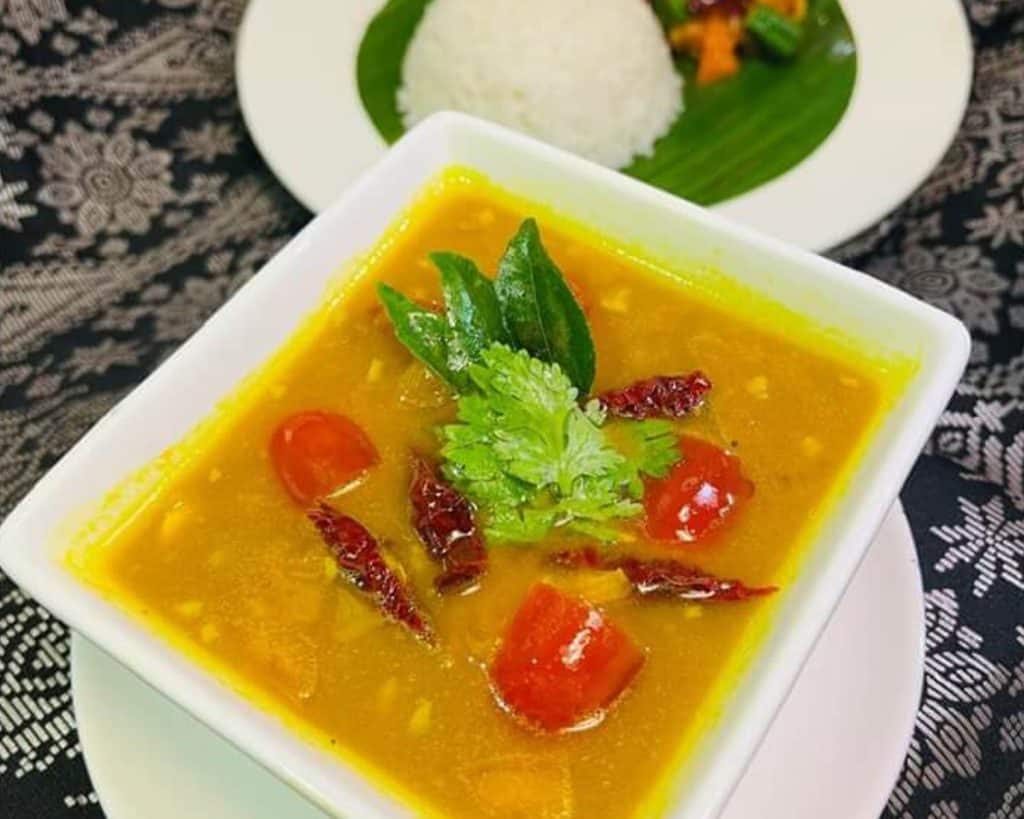
- 1 ½ cups water
- 3 pcs garlic crushed
- 1 tbsp tamarind paste
- 1 ½ tbsp tamarind powder
- 1 tomato cut into cubes
- 6 pcs coriander leaves chopped and divided into two
- 3 pcs curry leaves
- ½ tsp cumin seeds
- ½ tsp black peppercorns
- salt to taste
Instructions
- In a pot, combine the water, crushed garlic, tamarind paste, turmeric powder, cubed tomato, half of the chopped coriander leaves (with stalks), curry leaves, and salt.
- Bring the mixture to a boil over high heat and cook for 2 minutes. Reduce the heat to medium-high and continue cooking for 7 minutes.
- Add the cumin seeds and black peppercorns, and bring it back to a boil.
- Stir in the remaining chopped coriander leaves, cover the pot, and let the flavors meld for at least 15 minutes to an hour.
- Serve the soup with rice.
Notes
“Tamarind aids in milk production and relieves constipation. Combined with spices like turmeric, cumin, garlic, and pepper, it makes rasam rich in antioxidants, which promote wound healing and reduce inflammation. To ensure a balanced meal, serve rasam with a protein source such as fish, chicken, or tofu.”
– Columbia Asia Hospital – Iskandar Puteri Dietitian Yap Pau Lin
Nutrition
Calories: 307kcal
Carbohydrates: 62.8g
Protein: 6.8g
Fat: 2.3g
Iron: 1098mg
Grilled Chicken Satay
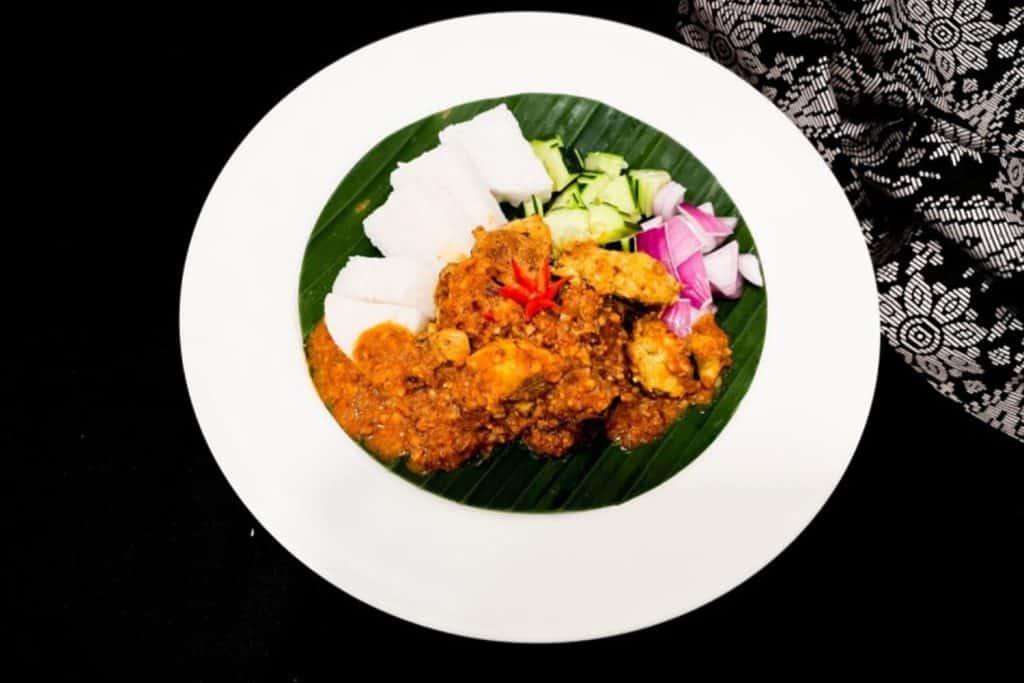
Ingredients
- 2 tsp Malay spice mix of cumin, fennel seeds and coriander seeds
- 3 stalks lemongrass blended
- 1 tbsp galangal
- 2 tsp turmeric blended
- 2 tsp sugar
- 160 g chicken breast cut into small pieces
- salt to taste
Instructions
- Heat a pan. Add the Malay spices and dry roast until fragrant.
- Blend lemongrass, galangal, turmeric, garlic, onions, sugar and salt.
- Add the roasted Malay spices and continue to blend until smooth.
- Marinate the chicken breast pieces with the blended mixture.
- Bake or grill the chicken breast until cooked through.
- Ready to serve with rice cubes, chopped cucumber, and chopped onions.
Notes
“Spices like turmeric, ginger, and galangal are known for their warming properties, which are great for women who are thought to have a ‘cold’ body after giving birth. Grilled foods are also lower in calories, making them a good choice for managing weight during the confinement period.”
– Columbia Asia Hospital – Iskandar Puteri Dietitian Yap Pau Lin
Nutrition
Calories: 341kcal
Carbohydrates: 51.1g
Protein: 28.4g
Fat: 2.8g
Sodium: 565mg
Idli with Dhal
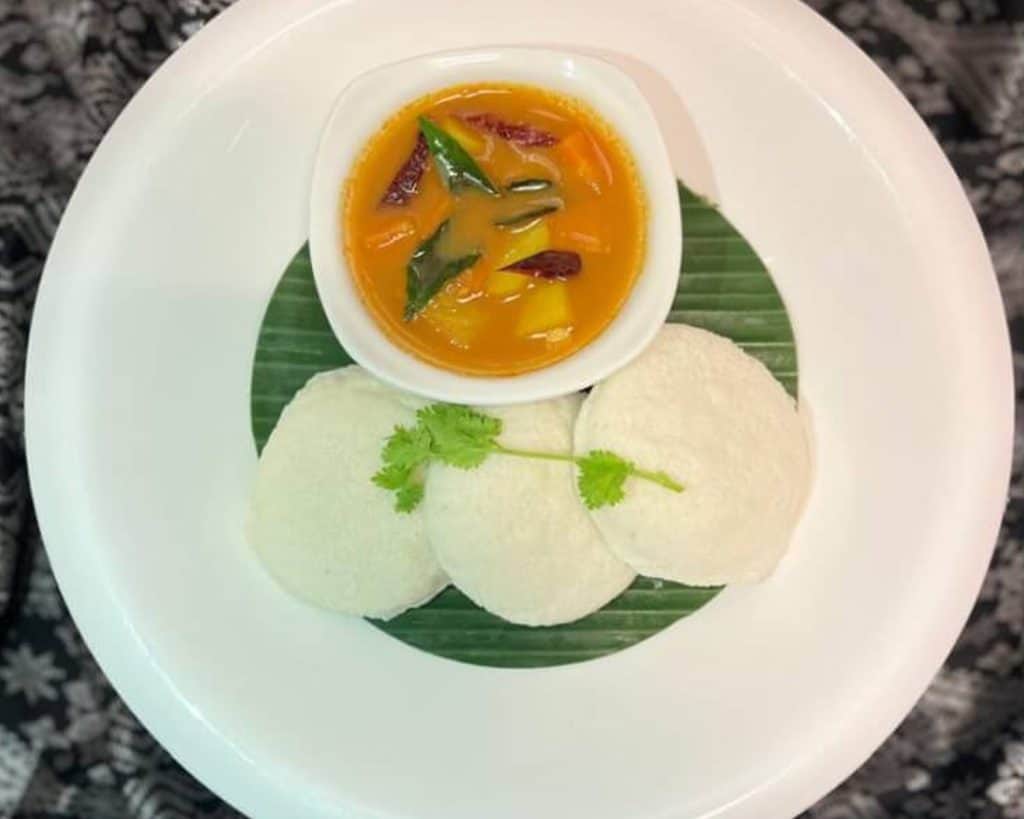
Ingredients
- 2 tbsp dhal
- 3 cloves garlic blended
- 3 slices ginger blended
- 1 dried chili blended
- 1 tbsp vegetable oil
- ½ tsp cardamom
- ¼ tsp cloves
- 1 cinnamon stick
- ¼ tsp black peppercorns
- ¾ tsp cumin seeds
- 1 shallot chopped
- 3 tsp tomato puree
- ½ tsp ground cumin
- ½ tsp ground coriander
- ½ tsp ground turmeric
- 3 pcs tomatoes cut into cubes
- 3 pcs potatoes cut into cubes
- 3 pcs carrots cut into cubes
- 1 cup water
- 3 pcs coriander leaves
- salt to taste
- pepper to taste
Instructions
- Boil the dhal in water until it is soft.
- Blend the garlic, ginger, and dried chili until smooth.
- Heat the oil in a pan. Add cardamom, cloves, cinnamon stick, black peppercorns, and cumin seeds. Cook until fragrant.
- Add the chopped shallot to the pan and cook until it softens.
- Stir in the blended mixture and continue to cook for 1 minute.
- Add the tomato puree and stir well.
- Then add ground cumin, ground coriander, and ground turmeric. Cook for a few minutes until well mixed.
- Add the potato, carrot, tomato, and cooked dhal to the pan along with 1 cup of water.
- Stir well and let it simmer over medium heat until the flavours meld together.
- Add chopped coriander leaves and season with salt and pepper.
- Serve with 3 pieces of Idli to complete a serving.
Notes
“Spices such as cumin and cardamom are good for digestion and support lactation. Dhal serves as a protein-rich base, complemented by a variety of vegetables, making this dish rich in fibre, vitamins, and minerals.”
– Columbia Asia Hospital – Iskandar Puteri Dietitian Yap Pau Lin
Nutrition
Calories: 588kcal
Carbohydrates: 87.9g
Protein: 19.5g
Fat: 18g
Sodium: 1379mg
Green Papaya and Fish Soup
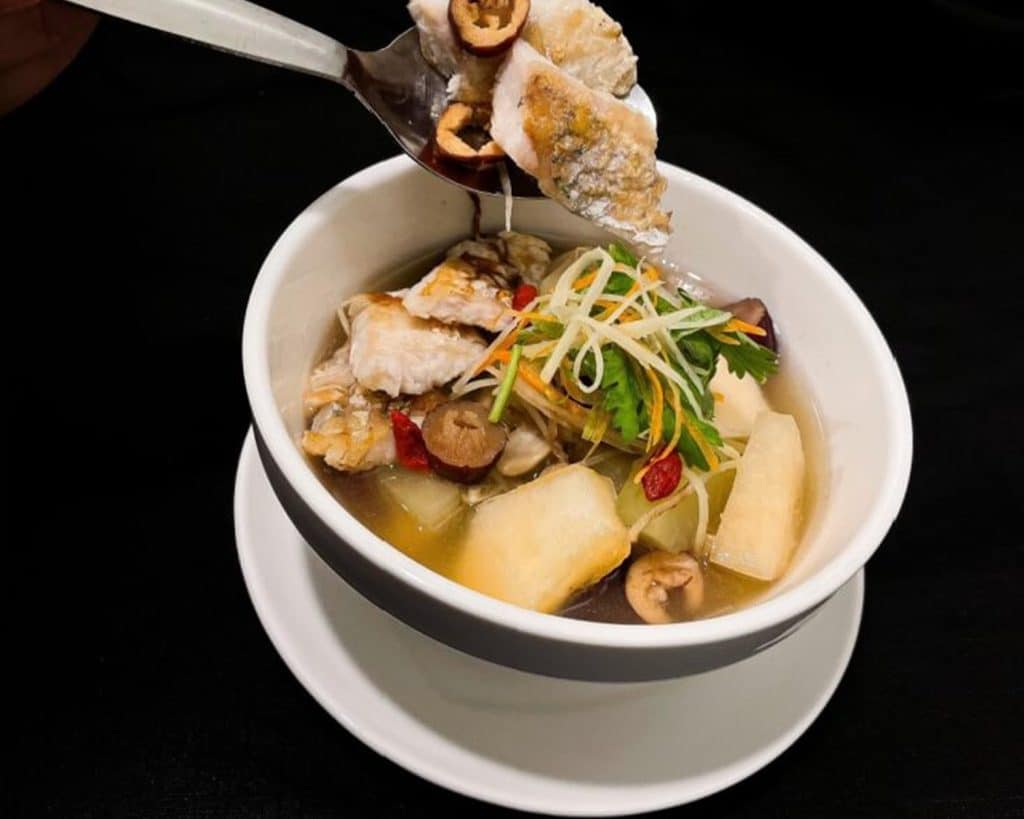
Ingredients
- 2 tbsp cooking oil
- 160 g fish slice
- 4 slices ginger
- 5 pcs red dates
- 5 pcs peanuts
- 1 ½ cup water
- 1 cup green papaya cubes
- salt to taste
- pepper to taste
Instructions
- Heat cooking oil in a pan over medium heat.
- Fry the fish slices with 2 slices of ginger until golden brown. Remove and transfer the fried fish to a pot.
- Add the red dates, remaining ginger slices, peanuts, and boiling water to the pot with the fish.
- Cover the pot and let it boil for about 1 hour until the water becomes cloudy.
- Add the diced green papaya pieces to the soup and continue to boil for another 15-20 minutes.
- Season the soup with salt and pepper.
- Ready to serve with rice.
Notes
“Green papaya is recommended for lactating mothers as it stimulates breast milk production and replenishes essential energy levels after childbirth. Peanuts, being rich in iron, support blood production and overall maternal health.”
– Columbia Asia Hospital – Iskandar Puteri Dietitian Yap Pau Lin
Nutrition
Calories: 751kcal
Carbohydrates: 71g
Protein: 38.5g
Fat: 36
Sodium: 584mg
Creamy Fish Noodle Soup
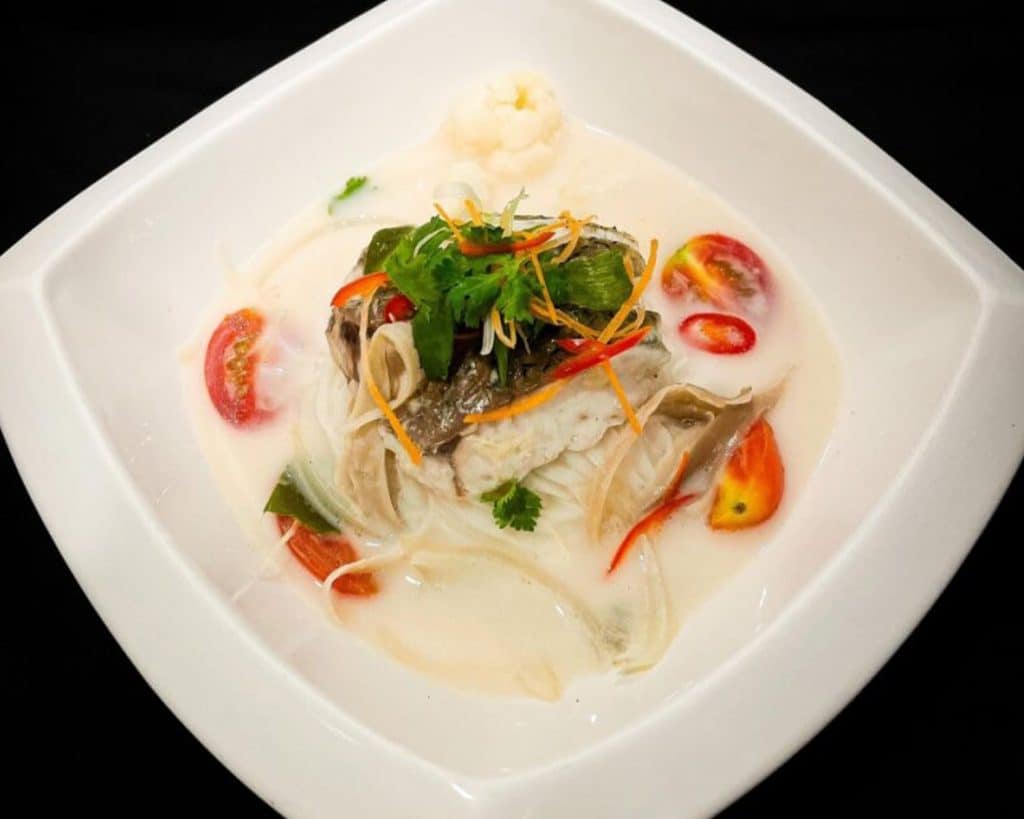
Ingredients
- 160 g fish slices
- 1 tsp sesame oil for marinade
- ½ tsp light soy sauce for marinade
- 1 ½ cups water
- 2 ginger slices
- ½ stalk lemongrass
- 3 pcs coriander leaves
- ¼ cup cauliflower chopped
- ¼ cup mushroom sliced
- 2 pcs cherry tomatoes halved
- 40 ml evaporated milk
- 1 tsp light soy sauce
- ½ tsp sesame oil
- salt to taste
- pepper to taste
Instructions
- Marinate the fish slices with sesame oil and light soy sauce for at least 10 minutes.
- Steam the marinated fish for 5 minutes.
- In a pot, add water, ginger slices, lemongrass, and coriander leaves. Bring it to a boil.
- Add cauliflower, mushroom, and cherry tomatoes to the boiling water. Cook until the vegetables are tender.
- Stir in the evaporated milk, light soy sauce, sesame oil, salt and pepper.
- Serve with noodles.
Notes
“Fish is an excellent source of protein and contains healthy unsaturated oil. Both fish and healthy oil promote wound healing, making fish an ideal food for women recovering from childbirth, particularly those who have had a Caesarean section.”
– Columbia Asia Hospital – Iskandar Puteri Dietitian Yap Pau Lin
Nutrition
Calories: 424kcal
Carbohydrates: 49.2g
Protein: 34.6g
Fat: 9.7g
Sodium: 1028mg
Sesame Oil Chicken
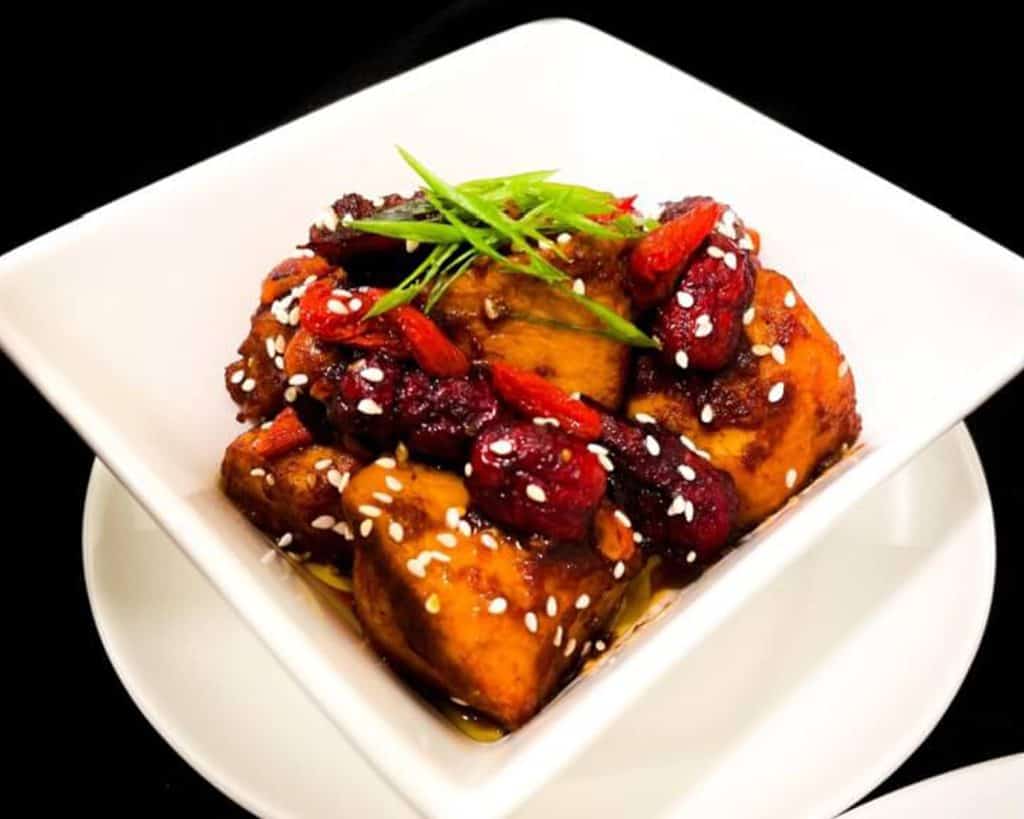
Ingredients
- 2 slices ginger
- 1 tbsp sesame oil
- 160 g chicken cut into bite-sized pieces
- ½ cup water
- 5 pcs red dates
- ½ tbsp wolfberries
- ½ tsp white sesame seed
- salt to taste
Instructions
- Heat a pot over medium heat. Add the ginger slices and black sesame oil. Sauté until the edges of the ginger turn brown.
- Add the chicken pieces and sauté for about 5 minutes.
- Pour in the water, and add the red dates and wolfberries.
- Bring to a simmer, then cover and cook for 15 minutes.
- Season with salt to taste.
- Garnish with white sesame seeds and enjoy with rice or as desired.
Notes
“Sesame oil, red dates, and wolfberries are power foods that promote blood circulation. Additionally, sesame oil is known to reduce inflammation and swelling, and relieve constipation in postpartum mothers.”
– Columbia Asia Hospital – Iskandar Puteri Dietitian Yap Pau Lin
Nutrition
Calories: 495kcal
Carbohydrates: 55.2g
Protein: 27.3g
Fat: 18.2g
Sodium: 542mg
Tantalising Postpartum Meals to Speed Up Your Healing

So mummies, let’s remind ourselves that postpartum meals don’t need to be bland or boring.
Take this chance to enjoy flavourful foods that boost your recovery and wellbeing.
Nourish yourself with meals rich in taste and nutrients to make this special time both enjoyable and beneficial.
This postpartum period marks the exciting start of your motherhood journey.
Celebrate each meal as a step toward feeling your best and embracing the joys of new motherhood.
You’ve got this, mummies!
Share:
Was this article helpful?
17 September 2024
•6 minute read
Tired of Bland Postpartum Food, Mummies? Try These Asian Delights
Articles and Video
Learn more about Café Columbia in Columbia Asia
Learn MoreShare:
Was this article helpful?
Health Packages
Elevate your health with tailored health packages at Columbia Asia Hospital. Take charge of your health journey today.

